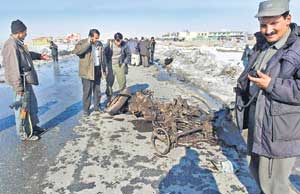
NATO in Afghan soup
NEW YORK - As the security situation in Afghanistan continues to deteriorate, the US and the North Atlantic Treaty Organisation (NATO) are engaged in a war of words over the escalation of violence in the country. The strains in the alliance have virtually reached breaking point. The US, which is heading towards a military debacle in Afghanistan, is partly blaming NATO for the dramatic resurgence of the Taliban whose suicide attacks have destabilised the country and demoralized Western troops. The Bush administration is challenging both the professionalism and the paucity of NATO troops in Afghanistan. A seemingly frustrated US Defence Secretary Robert Gates took a potshot at NATO when he said: "We have to acknowledge the reality that the (Western) alliance as a whole has not trained for counter-insurgency operations, even though individual countries have considerable expertise." Gates' grouse was that Western military forces in Europe were geared to fight a Cold War with the former Soviet Union -- not to battle insurgents, and certainly not in the rugged mountains of battle-hardened Afghanistan with a formidable past. Although Gates later tried to soft-pedal his harsh comments, the Western alliance reacted angrily. A British conservative MP Patrick Mercer lashed out at Gates calling his comments "bloody outrageous." The Netherlands and Canada, two countries taking an active role in Afghanistan and who have also sacrificed some of their soldiers in a US-driven military adventure, were peeved by Gate's comments. The Canadian government has already threatened to withdraw its contingent of about 2,500 troops out of Kandahar province unless the Western alliance provides an additional 1,000 troops. Only France has so far committed to provide more troops. But several other members of the alliance, including Germany, Italy and Spain, have refused or are dragging their feet on troop supplies. They are either convinced that Afghanistan is at a military dead-end or do not want to sacrifice their soldiers. Having claimed "success" in its troop surge in Iraq, the Bush administration is planning to send in an additional 2,200 troops to Afghanistan before the summer (when the Taliban is expected to intensify its battle against the occupying force). With more than 135,000 troops in Iraq, the US military is already feeling the strain. The troop surge in Afghanistan would be an added burden that could stretch US forces thin. In contrast, the Western alliance has about 42,000 troops in Afghanistan, of which about 26,000 are Americans. But the military commanders on the ground are demanding an additional 7,000 troops. Conscious of the growing quagmire, most members of NATO are unwilling to risk their soldiers fearing a domestic political backlash in their home countries. The US cannot afford to meet all of the requirements -- beyond the 2,200 Marines and perhaps and an additional 1,000 -- because of its commitments in Iraq. A New York Times report from Kabul said last week that as a result of an increase in the number of Taliban suicide bombings, specifically in southern Afghanistan, "the country is slipping toward anarchy." The deteriorating military situation in Afghanistan has also forced a visit to Kabul both by US Secretary of State Condoleezza Rice and the British Foreign Secretary David Miliband. Meanwhile, Afghan President Hamid Karzai, a US quisling, is beginning to lose friends both in the US and Western Europe. He remains disillusioned about his physical and mental capacity to fight the Taliban and run a corruption-free government in Kabul. Last month Karzai was also embroiled in a political dispute when he rejected a British politician Paddy Ashdown as a UN special envoy to Afghanistan. The rejection was primarily over a dispute about Ashdown's enhanced mandate in Afghanistan: a mandate that smacked of British colonial rule of the country. At the recently-concluded Davos Forum in Switzerland, Karzai criticised British forces in Helmand where Taliban forces have increasingly taken an upper hand. As Western nations continue bickering over Afghanistan, the Taliban has intensified its war against the military occupiers of the country. As has been proved in past history, Afghanistan is a country that no colonial power succeeded in conquering -- permanently. With the US and NATO sharply divided over the war in Afghanistan, the future seems unpredictable. As Rice told reporters last week: "There are a lot of cooks in the kitchen. I can understand why there could be confusion, and we owe it to President (Hamid) Karzai to have an effective international coordinator." |
|
||||||
|| Front
Page | News | Editorial | Columns | Sports | Plus | Financial
Times | International | Mirror | TV
Times | Funday
Times || |
| |
Reproduction of articles permitted when used without any alterations to contents and the source. |
© Copyright
2008 | Wijeya
Newspapers Ltd.Colombo. Sri Lanka. All Rights Reserved. |
